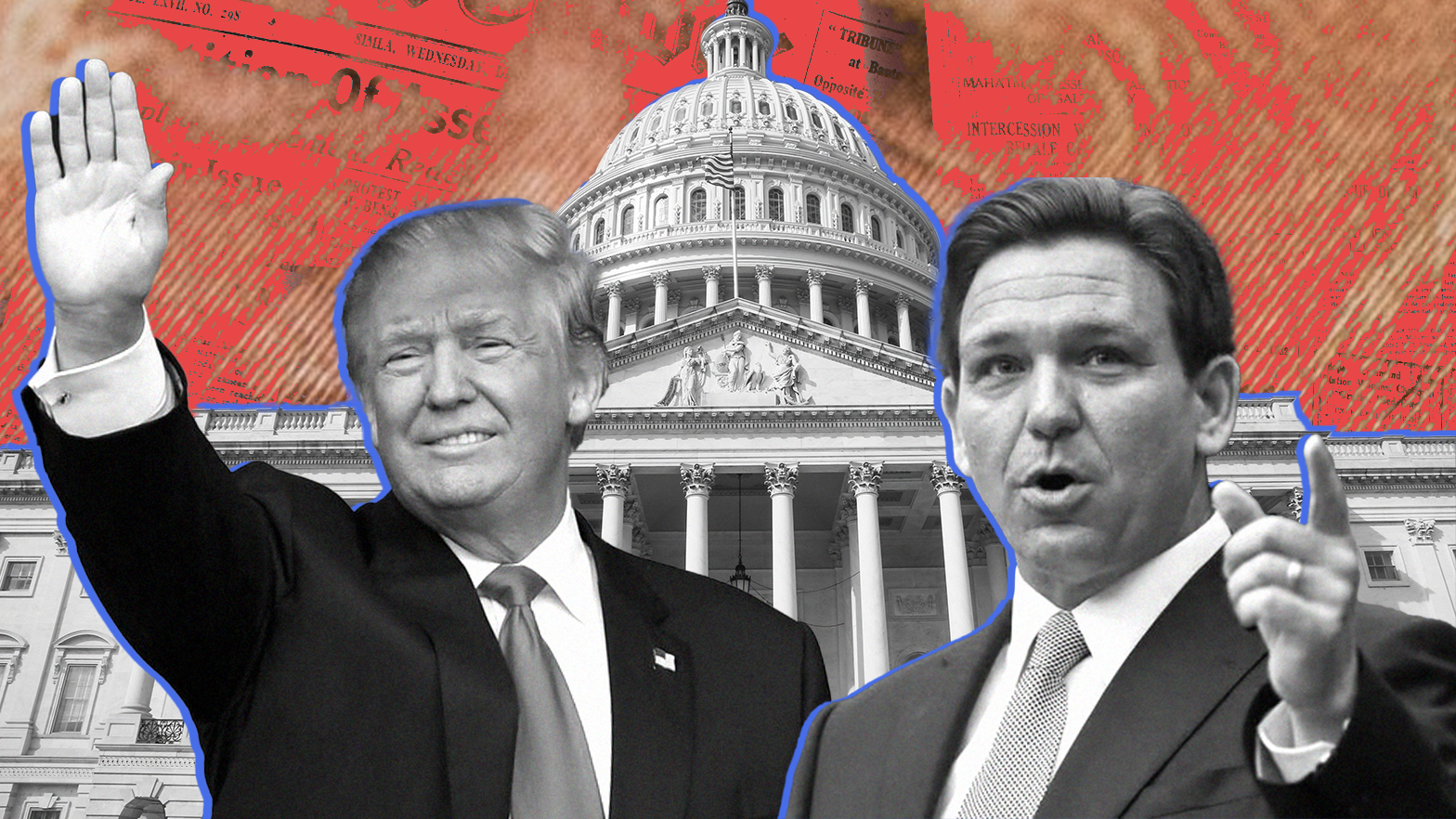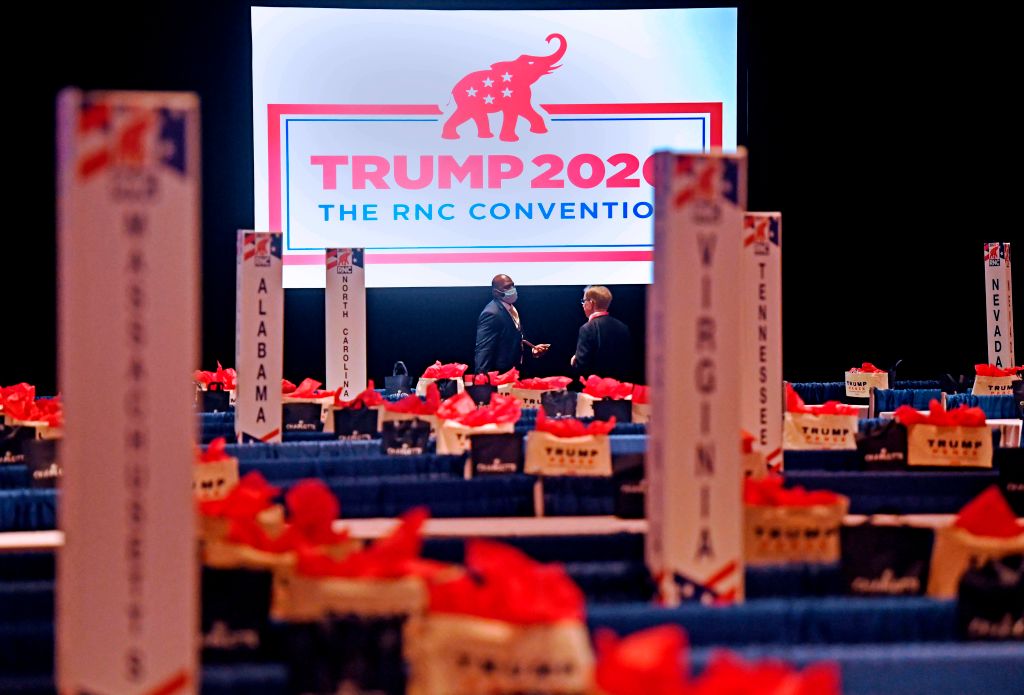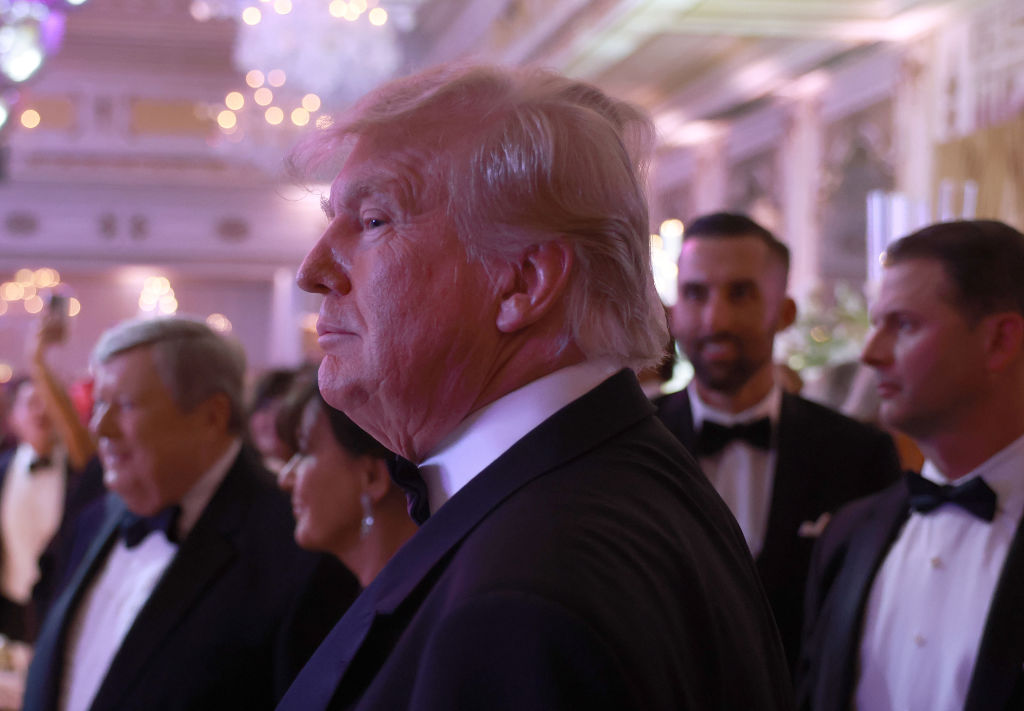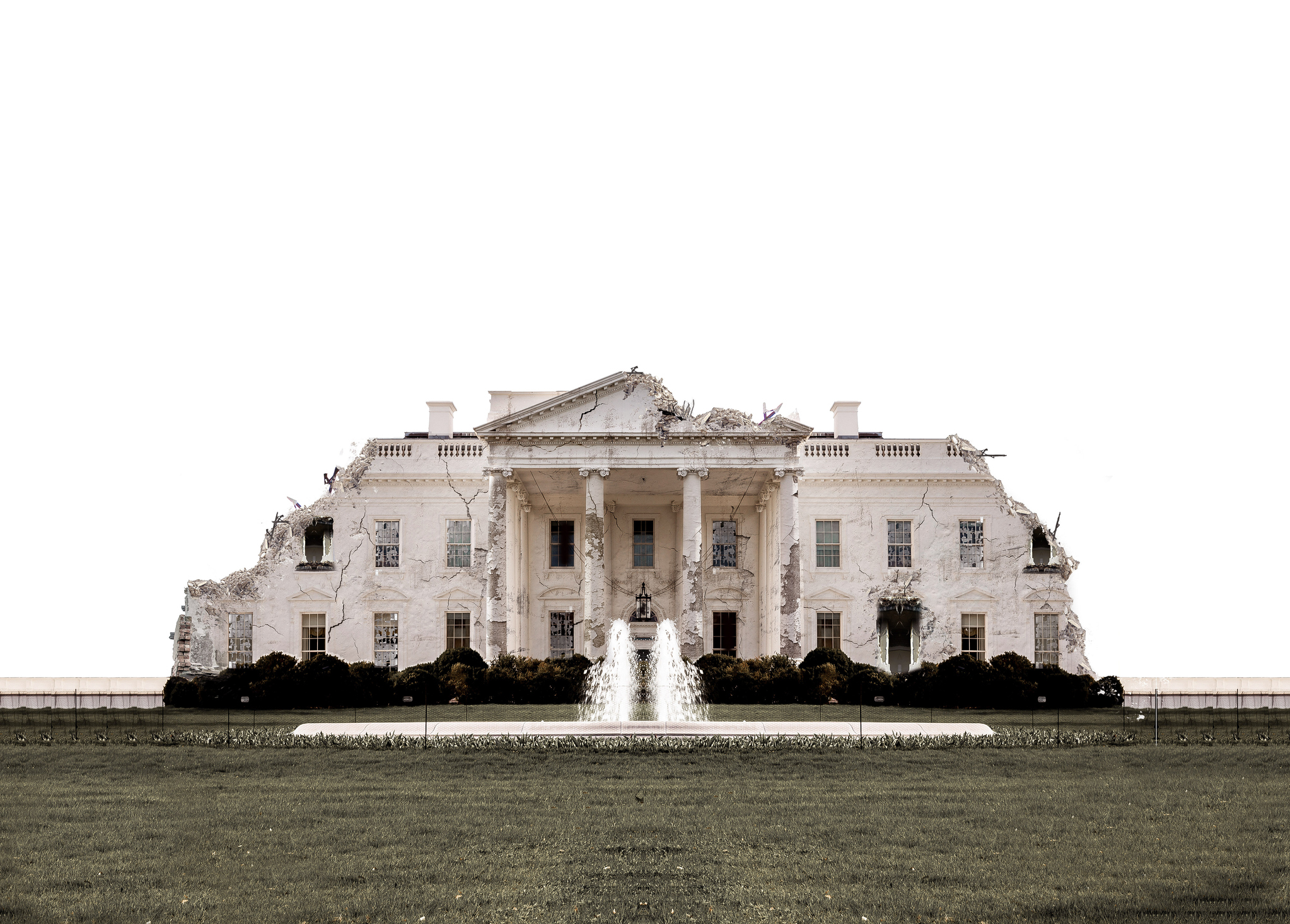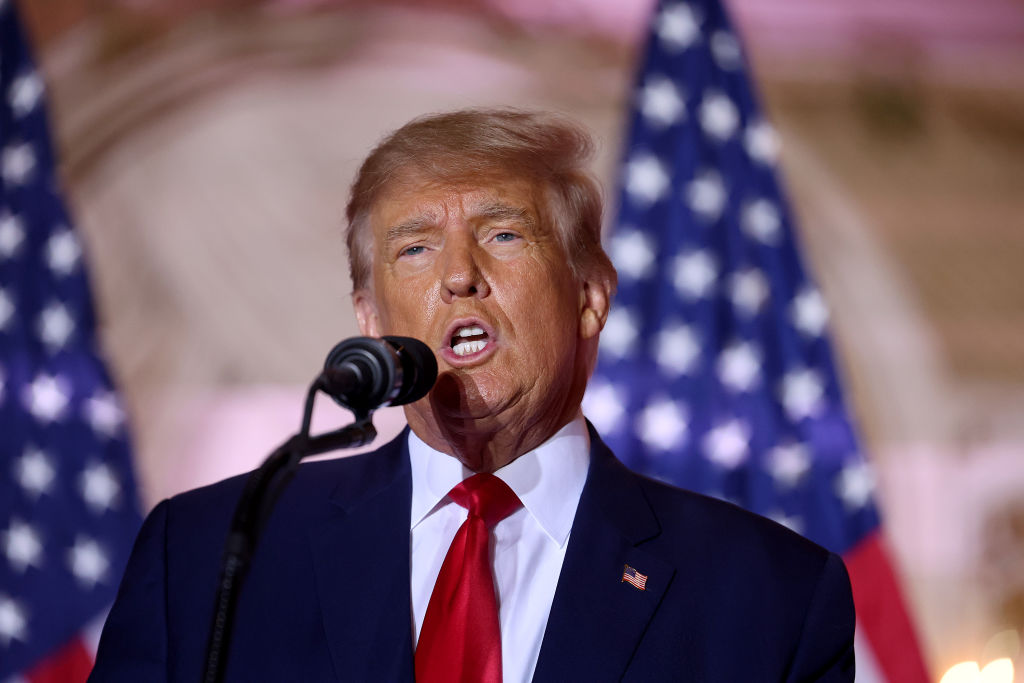Uncompromising discipline on crime is a must to merit the Republican nomination.
Monster Slayers Wanted

A time for unreasonable expectations and irrational politics.
To understand how to view Trump, I think it’s important to appreciate why the showdown he kicked off is not yet finished.
I’ve explained elsewhere that even when we set aside any claims about outright voter fraud, it’s clear the federal government is no longer accountable to the will of the people. Thus, our electoral system over the last 50 years most nearly resembles the Las Vegas gambling cartel. The casinos have the same relationship to their customers that the permanent government in DC has to the Republican base. The game is designed to maintain the illusion of fairness by consistently permitting a significant number of winners (but never too many). Some lucky folks periodically hit a jackpot—perfectly calculated to impress the gullible. In fact, the casino might even show a quarterly loss now and then. Yet the final outcome, in aggregate, is never in doubt. Over the long term, the house always wins. Sound familiar?
In 2016, however, there was a glitch in the system. Trump and the establishment went all-in against each other in the highest-stakes game—the presidency—and he unexpectedly drew a straight flush. The pit bosses reacted accordingly: that result was unacceptable and could not be allowed to stand. They destroyed his presidency, criminalized his supporters, and sent the FBI to raid his home after he left office. Yet Trump still won’t go away. So now the question for both the deep state and the MAGA voters is what to do about him.
After the Justice Department sent agents on a concocted mission to search Trump’s Mar-a-Lago home for “illegal” classified information, I concluded that the establishment authorities would not have made such a bold move unless they were certain that Trump would never again be in a position to retaliate and hold them accountable. The raid seemed to me strong evidence for Mike Anton’s argument that “they can’t let him back in.” Of course, that’s simply an unconfirmed suspicion. The ruling class does not yet exercise total control, and chance or providence could still deal us another ace.
For the voters, therefore, the issue is more complicated. However bad things look from our side, the Left remains frustrated, even frantic, that so many Americans still resist the progressive agenda. Consider a typical article in the Washington Postearlier this month, which reported as fact that “a sizable portion of the GOP baselessly doubts the accuracy of our elections.” Note the adverb. This obsessive need to reenforce the narrative, every single time, reveals a deep sense of desperation: they want their woke utopia now.
The MAGA movement represents the third and (I believe) final attempt by the American people to preserve the last sliver of self-government. The first and second attempts were Nixon’s re-election in 1972 and the Reagan presidency. Nixon, like Trump, had to be utterly neutralized in politics by the deep state when he devoted his re-election campaign to decentralizing federal authority and reining in the bureaucracy. (Reagan was spared this fate to some degree, because his focus on the Cold War diverted much of his attention away from the domestic battle.)
Today, Trumpism has been destroyed officially but not literally, to adapt a phrase. Unlike Nixon, Trump refuses to sign his own political death certificate. So let’s consider the possibility that he still has a chance. To the degree he has not already alienated a critical mass of MAGA voters, the best case for re-electing him is two-fold. First, he is in the strongest position and has the greatest motivation to finish the fight. Certainly, there are arguments against this proposition. I will get to those, and the case for Ron DeSantis, in a moment.
Second, the act of sending Trump back to finish what he (or rather, we) started would send the unmistakable message that it is the people—not the beltway bureaucracy, or the tech giants, or the Washington Post—who choose the president. Spurning all the official hand-wringing and precious tut-tutting about how Trump is a threat to “Our Democracy” would represent an act of stubborn, (small-d) democratic defiance. Separate from the issue of controlling the bureaucracy, the voters would make it clear that the citizens, not the ruling class, decide what is “illegitimate,” “deplorable,” or “unacceptable.”
Politics as Unusual
Of course, Trump is undisciplined and vain and has an uncanny knack for stepping on his own… toe. But it’s vital to remember that he isn’t a normal politician and should not be regarded as one. In fact, there are no normal politicians anymore, at least not at the federal level. We need to be unconventional in thinking about what’s necessary in this post-normal, post-constitutional regime. We can’t judge either Trump or DeSantis, or any other contender who may emerge, according to the old standards.
Look at who is ostensibly running Washington. Is Joe Biden normal? Nancy Pelosi? Mitch McConnell? Combined, these coin-operated mummies have stalked the earth for 242 years and haunted the corridors of political power for 132 of those years. Biden has held office in the federal government longer than Alexander Hamilton was alive. Of course, Trump, at age 76, is almost qualified to join the octogenarian horror show himself. Yet his four years in the Oval Office represent his entire tenure as an elected official. In swamp years, he is a baby.
In terms of political savviness, however, it’s possible that he is no longer a babe in the woods—or at least so he claims. Tom Klingenstein’s report on the phone callhe had with Trump in October is encouraging (setting aside whether Trump would actually follow through on what he says):
I asked President Trump what two or three things he would do differently were he to get a second term. He gave me a very good answer, I think—he said, “People, people, people.” Obviously, he knows that many in his administration ill-served him, sometimes even undercut him…. I asked what he would do differently were there a next time. He responded in the common-sense way he invariably does: “I now know the right people,” he said.
But even finding and hiring the right people is not enough. It is a paradox that constitutional government can’t be implemented (or, I would argue, restored) through constitutional means. Even if a president wanted to govern in strict accordance with the Federalist, it isn’t possible. Imagine telling James Madison that the chief executive can’t fire 95 percent of the people in the executive branch.
This points to the real problem with our current system. A casino at least operates according to clear rules. Everyone who bets (even the gambling addict) knows the game is rigged. People keep playing because the margin is sufficiently thin to make it fun and “keep hope alive,” in the words of one notable con man.
But in Washington, there are no longer any clear rules. To behave rationally, therefore, is in a way irrational. In his great work One Day in the Life of Ivan Denisovich, Aleksandr Solzhenitsyn explained that in the arbitrary, illogical world of the Soviet gulag, “You can turn a man upside down, inside out, any way you like.”
The unprincipled, ad hoc character of the current system helps explain the surreal situation of the former president releasing a powerful video with his agenda for restoring freedom of speech on the same day he announces an embarrassing line of digital trading cards bearing his image as a comic-book superhero. Of course this is maddening and ridiculous for his dwindling contingent of supporters. Yet which of these is more alarming for constitutional government? The United States can cope with another line of silly collectible merchandise (however demeaning this might be coming from a former occupant of the White House), but can it handle the abandonment of free speech by one political party and a merely half-hearted defense by the other?
The raises another compelling and unsettling question: Why does it fall to this (supposedly) has-been huckster to be almost alone in aggressively combatting the new woke fascism of government-corporate censorship? His video is the clearest, most forceful, most articulate statement on this subject made by any politician this year. Donald Trump may be going off the rails, but he’s a model of clarity and common sense compared to the train wrecks of American democracy and most of the Republican Party.
Who Can Fight?
So what about Ron DeSantis? My hope is that he will show the wherewithal for the iconoclastic creative destruction that will be necessary. At age 44, he was born the same year that Biden was re-elected to his second term (of seven) in the U.S. Senate. He may therefore have the opposite problem. It isn’t clear that he has become angry or unconventional enough. These are not normally qualities one wants in a president. But that’s the point.
DeSantis’s other problem—to exaggerate for the sake of argument—is that he’s all action and no talk. (This is not necessarily worse than Trump’s opposite vice.) That might sound like another strange criticism, but this is something that has always been true in politics: rhetoric matters. After all, to the degree that elections still have some efficacy, voters have to be persuaded, and that means words are as important as deeds. You can’t merely do the right thing, you have to explain it. DeSantis gives speeches, of course, and they are good as far as they go. But they need to be great. He needs to appreciate that even the most momentous results sometimes don’t speak for themselves. Consider Lincoln at Gettysburg.
It also isn’t yet clear—and DeSantis should make it clear—that he is sufficiently detached from the corrupt, uniparty establishment. His famous fight with Disney is a positive sign. But the Disney Corporation is like a fairy princess compared to the monsters in the deep state—especially the operatives in the national security apparatus, which is the most globalist, most secretive, and least accountable part of the bureaucracy. Trump’s mean tweets appalled the intellectual class, but the Republican base enjoyed them. Mocking the pretensions of our bureaucratic elites is not sufficient, but it’s a good first step in repudiating their legitimacy.
DeSantis could elevate this necessary mockery by explaining how the expertise of the administrative state is both tyrannical and bogus. This problem may not be overwhelming in Florida, but it’s certainly acute in Washington. If DeSantis wants to prove that he can do a better job of finishing the fight that Trump started, he needs to convince people—not just intellectually, but also in their guts—that he gets this. The crisis facing the country is not a battle over policies, even though issues like sex-hormone treatment for kids and Critical Race Theory in schools point to the fundamental issue. He needs to make clear that we are in a war for the soul of the nation.
The United States appears to be going through the final scenes of an epic story that began fifty years ago. Trump is in a way the second act of the Watergate drama. Christopher Caldwell set the stage well when he wrote this summer:
Nixon abused his power. Hundreds of well-trained minds, working in newsrooms and legal chambers across the country, established that beyond any shadow of doubt. But whether he was especially corrupt by the standards of American politics, whether he was more corrupt than the people who drove him out of town in disgrace, whether his corruption was sufficient to justify wresting from the American people their right to choose their president, whether corruption was even the reason the presidency was taken from him—these are questions that have grown more troubling as the years have passed.
It remains to be seen if the administrative state will win the fight it started half a century ago. There is no certainty one way or the other. Either Trump or DeSantis—or someone else—could triumph or fail. One thing we know for sure is that no president will succeed unless the American people do their part by proving that the American experiment is not yet finished.
The American Mind presents a range of perspectives. Views are writers’ own and do not necessarily represent those of The Claremont Institute.
The American Mind is a publication of the Claremont Institute, a non-profit 501(c)(3) organization, dedicated to restoring the principles of the American Founding to their rightful, preeminent authority in our national life. Interested in supporting our work? Gifts to the Claremont Institute are tax-deductible.
And rightly so.
The 2022 midterms were a blessing in disguise for the GOP.
Donald Trump, the GOP, and 2024.
Whoever wins in 2024, our problems run deeper.
We cannot afford a repeat performance.

